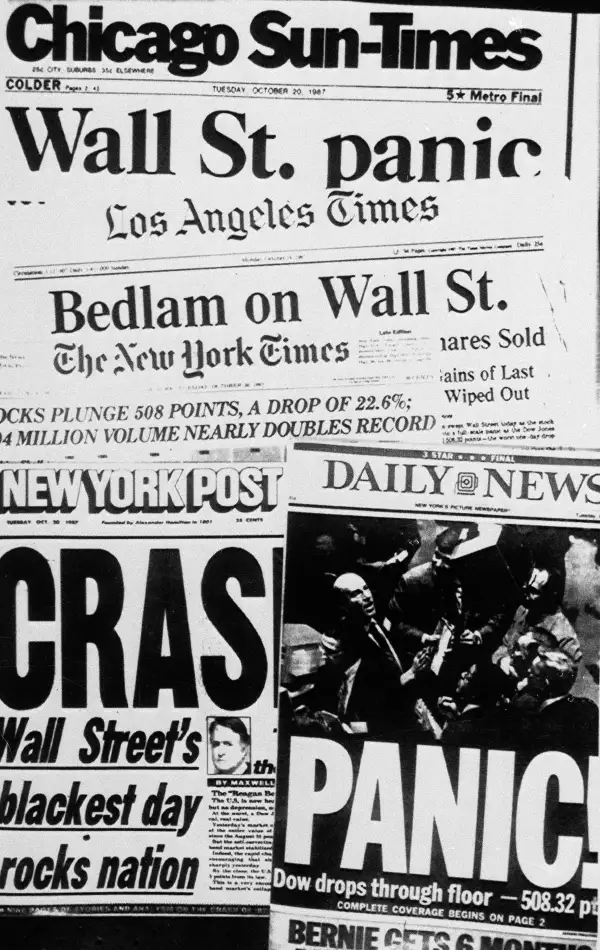What Black Monday, the Worst One-Day Stock Plunge in History, Would Look Like Today
Money is not a client of any investment adviser featured on this page. The information provided on this page is for educational purposes only and is not intended as investment advice. Money does not offer advisory services.

Thirty years ago today, the stock market suffered its worst one-day plunge ever. The Dow Jones industrial average fell 508 points in 1987 on what's became known as "Black Monday."
That may not seem like much in this day and age, when the Dow routinely gains or loses 100 points in a single day.
But on a percentage basis, Black Monday represented a staggering 22.6% loss in stock market value in less than seven hours of trading. In fact, the next worst days in investing history—the Oct. 28 and Oct. 29, 1929 sell-offs that ushered in the Great Depression—look "tame by comparison," says Sam Stovall, chief investment strategist for CFRA.
Yet unless you were old enough to be an investor in 1987, it's hard to really appreciate just how scary Black Monday was on Wall Street.
To be sure, most market watchers are quick to point out that Black Monday is highly unlikely to repeat itself. That's in particular because "the stock market stands on a much stronger fundamental and technical foundation today than it did in October 1987," says John Lynch, Chief Investment Strategist for LPL Research.
Still, what if it did? What if a crash of Black Monday magnitude were to hit Wall Street today?
Here's how bad the carnage would be in today's terms:
1. The Dow would plunge 5,236 points in a single day.
To put that in perspective, the worst single-day loss for the Dow Jones industrial average—in terms of points, not percentages—was the 777-point drop on Sept. 29, 2008, when the House of Representatives initially voted against bailing out Wall Street amid the global financial crisis.
Congress would eventually pass the Troubled Asset Relief Program (known as TARP), in part on fears that failure to do so would send the stock market down even further. Still, as frightening as that day was, Black Monday was nearly seven times more harmful in real terms.
2. The Dow would slide back to 17,921.
The last time the stock market was at this level was July 1, 2016, when the global markets were still trying to recover from the United Kingdom's Brexit vote to leave the European Union.
3. Nearly $6 trillion of stock market wealth would vanish.
On Oct. 19, 1987, the Dow's 22.6% decline wiped out $500 billion of wealth. That sounds like a lot, but it pales in comparison to the potential losses now.
That's because the collective value of all the stocks in the U.S. now stands at $26 trillion.
To put it another way, if Black Monday were to strike today, Americans would lose more wealth than the total gross domestic product of Japan.
4. Jeff Bezos could lose $17 billion in net worth.
On Oct. 19, 1987, the tech sector fell 20%. If Amazon stock sank around 20% this time, founder Jeff Bezos—the second-richest man in the world—could see his net worth drop by more than $17 billion.
For perspective: That's more than the gross domestic product of Zimbabwe.
5. Apple's price/earnings ratio could slip into single digits.
As far as tech stocks go, Apple is considered a good deal. That's because its shares trade at a price/earnings ratio of around 15, based on projected earnings over the next 12 months. (The broad market's P/E, by comparison, currently is at around 18).
But if Apple's shares were to lose 30% of their value—which is what happened on Black Monday 1987—the stock's P/E ratio could slip below 10, making it a real steal in the eyes of Wall Street.
6. It might take three years for the Dow to break even.
As frightening as a 22.6% loss is, even scarier is how the math works.
Gains and losses in the stock market aren't even. If the market were to fall 22.6%, it would actually take a bigger 30% gain for the market to make up for all of its losses.
And based on the broad market's long-term average annual gain of 10%, that means it could take three years for the market to recover from another Black Monday.
